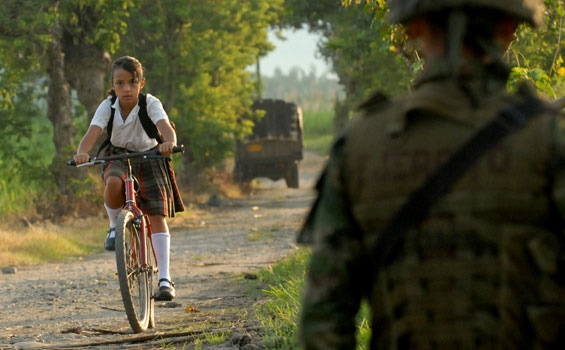Imagine you are a former member of a guerrilla. Imagine you met Jesus and you became a pastor.
 A student goes through a military control in Colombia. / Agencies
A student goes through a military control in Colombia. / Agencies
Imagine that you are a member of a guerrilla organisation or a criminal gang of drug traffickers.
Somebody (very courageously) tells you the good news of Jesus Christ, and you decide, after a lot of thought, to turn your life over to him and to follow his way in future. You believe that, since God has hurled all your sins into the depths of the sea (Micah 7:19), then they no longer exist. Therefore there is no need for you to confess or reveal to anybody the violent acts and crimes that you have committed in your past.
You grow in your Christian faith and become a respectable member of your community, for in your town there is a lot of coming and going of people, and nobody asks too many questions about the past. Surviving in the present is hard enough. Eventually you become a pastor and your church grows and becomes strong. Your congregation has suffered a lot from the violence and threats of guerrillas and drug traffickers, but they hold fast to their faith in Christ. Many of your church members are grieving, still looking for answers as to how their loved ones disappeared and where their mortal remains might be found.
You know that you were personally involved in the killing of some of their family members; and you could give them some of the answers which they are desperately looking for. But if the Bible says, As far as the east is from the west, so far has he removed our transgressions from us (Psalm 103:12), what need is there to dig up these things of the past that are now buried? After all, you reason, Moses did not have to face a human court for murdering an Egyptian; and King David was not punished by any human tribunal for having Bathsheba’s husband killed.
Significant political developments are taking place in your country. The government is at an advanced stage in peace negotiations with one of the main guerrilla groups, and there is talk of a peace agreement and a post-conflict situation.
You attend a seminar on these issues which is organised by a Christian group in your country. A pastor from another country is teaching; he says that, if a person repents and trusts Jesus Christ, he will not have to answer to God for his sins; but that does not necessarily mean that he will not have to answer to a human court for the crimes which he has committed. There is no fixed rule for everybody: you need to be guided by the Holy Spirit in deciding whether or not to reveal to people what you have done in the past.
You are deeply troubled by this teaching. You have been feeling increasingly uncomfortable about keeping members of your congregation in the dark with regard to what happened to their loved ones. You see their grief and their despair week by week, and you are aware that you could bring radical improvement to their lives, simply by telling them the truth that you know. But revealing the facts of the past means that probably you would lose your position as a pastor and spend many years in a very unpleasant, seriously overcrowded jail. Worse still, once your past came out into the open, you would become a marked man in the eyes of the members of the armed group to which you used to belong; and they would probably come and kill you well before the justice of the state could reach you. What do you do?
Imagine yourself in this situation. But it is far from imaginary. It is a real history of real people in Colombia, a country where I recently spent a week speaking with pastors and leaders about the issues facing the Colombian church in a post-conflict situation. As their country tries to escape from 70 years of violent conflict and moves slowly towards peace, the moral dilemmas facing Colombian Christians, especially in the conflict zones, are enormous.
What does it mean for Truth and Justice to be established in Colombia? 50,000 Colombian families are still searching for the truth about what happened to their loved ones who have disappeared. How can they find this truth? Can people really forgive one another for the many atrocities of the past, and live alongside each other in the future? And are they able to go one (big) step further and be reconciled to each other? What role can Christians play in this process, we who know the person who is the Truth and who will ultimately bring about Justice in the universe, we who know God’s forgiveness and have been reconciled to him? What advice should pastors and Christian leaders give on these issues?
Do pray for Colombia. This is a crucial moment. For the first time in many, many years there is a very real prospect of some measure of peace, though the process is still very fragile. Pray that Colombians will be able to pass on a positive heritage to their children, their grandchildren and future generations, a heritage which is different from the violence, extortion, fear and corruption which they have inherited from previous generations in so many parts of the country.
Michael Gowen worked for the European Comission in Brussels for 25 years.

Las opiniones vertidas por nuestros colaboradores se realizan a nivel personal, pudiendo coincidir o no con la postura de la dirección de Protestante Digital.
Si quieres comentar o